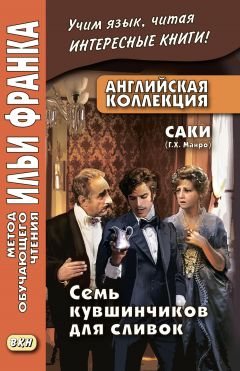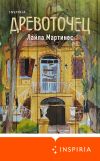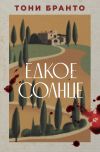Текст книги "Английская коллекция. Саки (Г. Х. Манро). Семь кувшинчиков для сливок / Saki. The Seven Cream Jug"

Автор книги: Саки
Жанр: Учебная литература, Детские книги
Возрастные ограничения: +16
сообщить о неприемлемом содержимом
Текущая страница: 4 (всего у книги 15 страниц) [доступный отрывок для чтения: 5 страниц]
“I expect it was the spaniel,” said the niece calmly (думаю, это из-за спаниеля, – спокойно сказала племянница; to expect – ожидать; /разг./ думать, /пред/полагать); “he told me he had a horror of dogs (он говорил мне, что боится собак: «имеет страх/боязнь собак»). He was once hunted into a cemetery somewhere on the banks of the Ganges by a pack of pariah dogs (однажды его загнала на кладбище где-то на берегах Ганга стая бродячих собак; to hunt – охотиться; преследовать, гнать; pack – связка; пакет; стая; свора; pariah – пария /представитель низшей касты в Индии/; пария, изгой), and had to spend the night in a newly dug grave (и ему пришлось провести ночь в свежевыкопанной могиле; to spend – тратить, расходовать; проводить /время/; newly – заново; недавно, только что; to dig – копать, рыть) with the creatures snarling and grinning and foaming just above him (а эти твари рычали, скалили зубы и исходили слюной прямо над ним; creature – создание, творение; животное, тварь; to foam – пениться; выделять пену изо рта; прийти в бешенство). Enough to make anyone lose their nerve (достаточно, чтобы заставить любого потерять самообладание; to make – делать; заставлять; nerve – нерв; нервозность; мужество, хладнокровие).”
Romance at short notice was her speciality (/сочинение/ небылиц экспромтом было ее основным занятием; romance – роман /какого-л. жанра/; романтическая литература; выдумка, небылица; at short notice – немедленно, тотчас, по первому требованию; notice – извещение, уведомление; speciality – специальность, профессия).
extraordinary [ɪk'strɔ:d(ǝ)n(ǝ)rɪ; ,ekstrǝ'ɔ:dɪn(ǝ)rɪ], cemetery ['semɪtrɪ], nerve [nɜ:v]
“A most extraordinary man, a Mr. Nuttel,” said Mrs. Sappleton; “could only talk about his illnesses, and dashed off without a word of good-bye or apology when you arrived. One would think he had seen a ghost.”
“I expect it was the spaniel,” said the niece calmly; “he told me he had a horror of dogs. He was once hunted into a cemetery somewhere on the banks of the Ganges by a pack of pariah dogs, and had to spend the night in a newly dug grave with the creatures snarling and grinning and foaming just above him. Enough to make anyone lose their nerve.”
Romance at short notice was her speciality.
The story-teller[1]1
Story-teller – рассказчик; сказочник; story – повесть; рассказ; история; сказка.
[Закрыть]
(Сказочник)
It was a hot afternoon (был жаркий полдень), and the railway carriage was correspondingly sultry (и в вагоне поезда было соответственно душно; railway – железная дорога; rail – рельс; way – путь, дорога; carriage – экипаж; карета; пассажирский вагон; to correspond – соответствовать; соотноситься; sultry – знойный; душный), and the next stop was at Templecombe, nearly an hour ahead (а следующая остановка была в Темплкоме почти через час; nearly – почти; около, примерно; ahead – будущий, грядущий; вперед; впереди). The occupants of the carriage were a small girl (пассажирами вагона были маленькая девочка; occupant – житель, обитатель; временный владелец; пассажир; to occupy – занимать /место, пространство, время/; захватывать, оккупировать), and a smaller girl, and a small boy (девочка поменьше и маленький мальчик). An aunt belonging to the children occupied one corner seat (тетушка, ехавшая с детьми, занимала одно угловое место; to belong – принадлежать /кому-л./; быть членом /группы, организации и т. д./), and the further corner seat on the opposite side was occupied by a bachelor (а дальнее угловое место на противоположной стороне занимал холостяк) who was a stranger to their party (который не был знаком с их компанией; stranger – незнакомец; посторонний человек; strange – незнакомый; чужой; странный; party – партия; отряд, команда; компания), but the small girls and the small boy emphatically occupied the compartment (но маленькие девочки и маленький мальчик не стесняясь занимали купе; emphatically – подчеркнуто, многозначительно; настойчиво, решительно; compartment – отделение; /ж.-д./ купе). Both the aunt and the children were conversational in a limited, persistent way (и тетушка, и дети вели разговор ограниченным и настойчивым образом = лаконично и упорно; both – оба, обе; как, так и; conversational – разговорный; разговорчивый; conversation – разговор, беседа; way – путь, дорога; способ, образ действия), reminding one of the attentions of a housefly that refuses to be discouraged (напоминая ухаживания комнатной мухи, которая отказывается признать поражение; attention – внимание; attentions – ухаживание; знаки внимания; house – дом, жилище; fly – муха; to discourage – лишать мужества; приводить в уныние; отбивать охоту; courage – мужество, храбрость).
carriage ['kærɪʤ], occupants ['ɒkjʋpǝnts], smaller ['smɔ:lǝ], persistent [pǝ'sɪstǝnt]
It was a hot afternoon, and the railway carriage was correspondingly sultry, and the next stop was at Templecombe, nearly an hour ahead. The occupants of the carriage were a small girl, and a smaller girl, and a small boy. An aunt belonging to the children occupied one corner seat, and the further corner seat on the opposite side was occupied by a bachelor who was a stranger to their party, but the small girls and the small boy emphatically occupied the compartment. Both the aunt and the children were conversational in a limited, persistent way, reminding one of the attentions of a housefly that refuses to be discouraged.
Most of the aunt's remarks seemed to begin with “Don't” (казалось, большинство замечаний тетушки начиналось с «нельзя»; remark – замечание; высказывание) and nearly all of the children's remarks began with “Why (а почти все реплики детей начинались с «почему?»)?” The bachelor said nothing out loud (холостяк ничего не говорил вслух; loud – громкий; громко). “Don't, Cyril, don't,” exclaimed the aunt (нельзя, Сирил, нельзя! – воскликнула тетушка), as the small boy began smacking the cushions of the seat (когда маленький мальчик начал шлепать подушки сиденья; to smack – чмокать; хлопать, шлепать), producing a cloud of dust at each blow (создавая облако пыли при каждом ударе; to produce – создавать, производить).
“Come and look out of the window,” she added (давай посмотри-ка в окно, – добавила она; to come – приходить; ну! живо! давай! /побуждение к действию/; to look out – выглядывать).
The child moved reluctantly to the window (ребенок неохотно подвинулся к окну; to move – двигать/ся/; перемещать/ся/). “Why are those sheep being driven out of that field?” he asked (почему тех овец угоняют с того поля? – спросил он; sheep – овца; овцы; to drive – гнать).
“I expect they are being driven to another field where there is more grass,” said the aunt weakly (думаю, их гонят на другое поле, где больше травы, – неубедительно сказала тетушка; to expect – ожидать; /разг./ думать, /пред/полагать; weak – слабый; нерешительный; неубедительный, шаткий).
remarks [rɪ'mɑ:ks], bachelor ['bæʧ(ǝ)lǝ], cushions ['kʋʃ(ǝ)nz], cloud [klaʋd], grass [ɡrɑ:s]
Most of the aunt's remarks seemed to begin with “Don't,” and nearly all of the children's remarks began with “Why?” The bachelor said nothing out loud. “Don't, Cyril, don't,” exclaimed the aunt, as the small boy began smacking the cushions of the seat, producing a cloud of dust at each blow.
“Come and look out of the window,” she added.
The child moved reluctantly to the window. “Why are those sheep being driven out of that field?” he asked.
“I expect they are being driven to another field where there is more grass,” said the aunt weakly.
“But there is lots of grass in that field,” protested the boy (но на этом поле полно травы, – возразил мальчик; lot – /разг./ большое количество, уйма; to protest – протестовать, возражать); “there's nothing else but grass there (там больше нет ничего, кроме травы). Aunt, there's lots of grass in that field (тетя, на этом поле полно травы).”
“Perhaps the grass in the other field is better (возможно, трава на другом поле лучше),” suggested the aunt fatuously (глупо предположила тетушка; to suggest – предлагать, советовать; /юр./ делать предположение; fatuous – бессмысленный, глупый, дурацкий).
“Why is it better?” came the swift, inevitable question (почему она лучше? – возник быстрый неизбежный вопрос; to come – приходить; появляться, возникать).
“Oh, look at those cows!” exclaimed the aunt (ах, посмотрите на этих коров! – воскликнула тетушка). Nearly every field along the line had contained cows or bullocks (почти на каждом поле вдоль железной дороги стояли коровы или бычки; line – линия; направление; железнодорожная линия; to contain – содержать в себе; вмещать; bullock – вол; бычок), but she spoke as though she were drawing attention to a rarity (но она говорила так, будто обращала внимание на диковину; to draw – тащить, тянуть; привлекать, притягивать; rarity – редкость; редкое явление; диковина; rare – редкий).
“Why is the grass in the other field better?” persisted Cyril (почему трава на другом поле лучше? – упорствовал Сирил).
nothing ['nʌθɪŋ], fatuously ['fætjʋǝslɪ], inevitable [ɪ'nevɪtǝb(ǝ)l], Cyril ['sɪr(ɪ)l]
“But there is lots of grass in that field,” protested the boy; “there's nothing else but grass there. Aunt, there's lots of grass in that field.”
“Perhaps the grass in the other field is better,” suggested the aunt fatuously.
“Why is it better?” came the swift, inevitable question.
“Oh, look at those cows!” exclaimed the aunt. Nearly every field along the line had contained cows or bullocks, but she spoke as though she were drawing attention to a rarity.
“Why is the grass in the other field better?” persisted Cyril.
The frown on the bachelor's face was deepening to a scowl (недовольное выражение на лице холостяка превращалось в хмурый вид; frown – сдвинутые брови; хмурый, недовольный вид; to deepen – делать/ся/ глубже; сгущать/ся/; deep – глубокий; сильный, интенсивный, насыщенный; scowl – хмурый вид; сердитый взгляд). He was a hard, unsympathetic man (это суровый, несимпатичный человек; hard – жесткий, твердый; суровый, холодный; грубый; unsympathetic – несочувствующий; несимпатичный), the aunt decided in her mind (решила тетушка про себя/мысленно; mind – ум, разум; дух; душа). She was utterly unable to come to any satisfactory decision about the grass in the other field (она была совершенно неспособна прийти к какому-либо удовлетворительному решению относительно травы на другом поле; utterly – крайне, совершенно; to be able to – мочь, быть в состоянии /сделать что-л./; able – способный, обладающий способностью).
The smaller girl created a diversion by beginning to recite “On the Road to Mandalay” (меньшая девочка зашла с другой стороны, начав декламировать «По дороге в Мандалай»; to create – создавать, производить; diversion – отклонение, отход /от курса, действий/). She only knew the first line (она знала только первую строку), but she put her limited knowledge to the fullest possible use (но использовала свое ограниченное знание самым полным /возможным/ образом; to put – класть; помещать; to put to use – вводить в употребление, использовать). She repeated the line over and over again in a dreamy but resolute and very audible voice (она повторяла эту строчку снова и снова мечтательным, но решительным и очень громким голосом; dream – сон, сновидение; мечта; audible – слышный; слышимый); it seemed to the bachelor as though someone had had a bet with her (холостяку казалось, будто кто-то поспорил с ней; bet – пари; to have a bet – держать пари) that she could not repeat the line aloud two thousand times without stopping (что она не сможет повторить эту строчку вслух две тысячи раз без остановки; time – время; раз). Whoever it was who had made the wager was likely to lose his bet (кто бы ни заключил это пари, он, похоже, проигрывал; wager – пари; ставка; заклад; likely – вероятный, возможный; to lose – терять; проигрывать).
frown [fraʋn], scowl [skaʋl], decision [dɪ'sɪʒ(ǝ)n], audible ['ɔ:dɪb(ǝ)l], thousand ['θaʋz(ǝ)nd]
The frown on the bachelor's face was deepening to a scowl. He was a hard, unsympathetic man, the aunt decided in her mind. She was utterly unable to come to any satisfactory decision about the grass in the other field.
The smaller girl created a diversion by beginning to recite “On the Road to Mandalay.” She only knew the first line, but she put her limited knowledge to the fullest possible use. She repeated the line over and over again in a dreamy but resolute and very audible voice; it seemed to the bachelor as though someone had had a bet with her that she could not repeat the line aloud two thousand times without stopping. Whoever it was who had made the wager was likely to lose his bet.
“Come over here and listen to a story (иди сюда и послушай сказку),” said the aunt, when the bachelor had looked twice at her and once at the communication cord (сказала тетушка, когда холостяк дважды взглянул на нее и один раз на шнур экстренного торможения; communication cord – сигнальная веревка, аварийный шнур; communication – передача, сообщение; средство связи).
The children moved listlessly towards the aunt's end of the carriage (дети нехотя переместились к тетушкиному углу /купе/; listlessly – вяло; равнодушно, без интереса; end – конец, край). Evidently her reputation as a story-teller did not rank high in their estimation (очевидно, ее репутация сказочницы не заслуживала высокой оценки по их мнению; evidently – очевидно, явно; несомненно; as – как, в качестве; to rank – строить/ся/ в шеренгу, в ряд; ценить, располагать по рангу; котироваться; rank – ряд; шеренга; звание, чин; ранг; высокое положение; estimation – оценка, суждение, мнение; уважение).
In a low, confidential voice (тихим доверительным голосом; low – низкий; тихий), interrupted at frequent intervals by loud, petulant questionings from her listeners (через частые промежутки времени = часто прерываемым громкими нетерпеливыми вопросами от ее слушателей; petulant – раздражительный, вздорный; нетерпеливый; questioning – допрос; расспрашивание), she began an unenterprising and deplorably uninteresting story about a little girl (она начала неувлекательную и прискорбно неинтересную сказку о маленькой девочке; unenterprising – безынициативный, инертный; enterprising – предприимчивый, активный, деятельный; deplorably – прискорбно; достойно сожаления) who was good, and made friends with everyone on account of her goodness (которая была добродетельной, со всеми вступала в дружеские отношения из-за своей добродетели; good – хороший; добрый; достойный, добродетельный; to make friends – подружиться, заводить друзей; on account of – из-за, вследствие, по причине /чего-л./; account – счет; причина, основание; goodness – доброта; любезность; добродетель), and was finally saved from a mad bull by a number of rescuers (и была в конце спасена от бешеного быка множеством спасителей; mad – сумасшедший; бешеный; number – число, количество; rescuer – спаситель, избавитель; спасатель; to rescue – спасать; избавлять) who admired her moral character (которые восхищались ее высокой моралью; to admire – восхищаться, восторгаться; moral character – моральная репутация; moral – моральный, нравственный; character – характер, нрав; репутация).
listen ['lɪs(ǝ)n], moved [mu:vd], frequent ['fri:kwǝnt], petulant ['petjʋlǝnt], rescuers ['reskjʋǝz], character ['kærɪktǝ]
“Come over here and listen to a story,” said the aunt, when the bachelor had looked twice at her and once at the communication cord.
The children moved listlessly towards the aunt's end of the carriage. Evidently her reputation as a story-teller did not rank high in their estimation.
In a low, confidential voice, interrupted at frequent intervals by loud, petulant questionings from her listeners, she began an unenterprising and deplorably uninteresting story about a little girl who was good, and made friends with everyone on account of her goodness, and was finally saved from a mad bull by a number of rescuers who admired her moral character.
“Wouldn't they have saved her if she hadn't been good (разве они не спасли бы ее, если бы она не была добродетельной)?” demanded the bigger of the small girls (/настойчиво/ спросила большая из маленьких девочек; to demand – требовать; настойчиво требовать ответа; спрашивать). It was exactly the question that the bachelor had wanted to ask (это был именно тот вопрос, который хотел задать холостяк; exactly – точно; именно, как раз; exact – точный; строго соответствующий; to ask – спрашивать; задавать /вопрос/).
“Well, yes,” admitted the aunt lamely (ну, да, – неубедительно признала тетушка; lamely – хромая; запинаясь; нескладно; lame – хромой; неубедительный), “but I don't think they would have run quite so fast to her help (но не думаю, что они так же быстро прибежали бы ей на помощь; quite – вполне, совершенно) if they had not liked her so much (если бы не любили ее так сильно; to like – нравиться, любить).”
“It's the stupidest story I've ever heard (это самая скучная сказка, /какую/ я когда-либо слышала; stupid – глупый, тупой; скучный),” said the bigger of the small girls, with immense conviction (с огромной убежденностью сказала бóльшая из маленьких девочек; immense – огромный, колоссальный; безмерный; conviction – осуждение; убеждение, убежденность).
“I didn't listen after the first bit, it was so stupid (я не слушал после начала: «после первого кусочка», она была такая скучная; bit – кусок, кусочек; небольшое количество),” said Cyril.
demanded [dɪ'mɑ:ndɪd], exactly [ɪɡ'zæktlɪ], immense [ɪ'mens], stupid ['stju:pɪd]
“Wouldn't they have saved her if she hadn't been good?” demanded the bigger of the small girls. It was exactly the question that the bachelor had wanted to ask.
“Well, yes,” admitted the aunt lamely, “but I don't think they would have run quite so fast to her help if they had not liked her so much.”
“It's the stupidest story I've ever heard,” said the bigger of the small girls, with immense conviction.
“I didn't listen after the first bit, it was so stupid,” said Cyril.
The smaller girl made no actual comment on the story (меньшая девочка никак не прокомментировала сказку; actual – фактический, реальный; comment – комментарий, замечание), but she had long ago recommenced a murmured repetition of her favourite line (а уже давно снова начала приглушенное повторение = тихо повторять свою любимую строчку; ago – тому назад; to recommence – снова начать; возобновлять; to murmur – шептать; бормотать).
“You don't seem to be a success as a story-teller (похоже, вы не пользуетесь успехом как рассказчицы; success – успех, удача; тот или то, что пользуется успехом),” said the bachelor suddenly from his corner (вдруг/внезапно сказал холостяк из своего угла).
The aunt bristled in instant defence at this unexpected attack (тетушка ощетинилась в мгновенной защите при этой = мгновенно ощетинилась, защищаясь от этой неожиданной атаки; to bristle – ощетиниться; рассердиться; defence – защита; оборона; to expect – ожидать).
“It's a very difficult thing to tell stories (очень трудная вещь = очень трудно рассказывать сказки; story – повесть; рассказ; история; сказка) that children can both understand and appreciate (которые дети могут и понять, и оценить),” she said stiffly (сухо сказала она; stiffly – сухо, чопорно; холодно; stiff – холодный; натянутый, чопорный).
“I don't agree with you (я с вами не согласен; to agree – соглашаться; сходиться во мнениях),” said the bachelor.
murmured ['mɜ:mǝd], bristled ['brɪs(ǝ)ld], appreciate [ǝ'pri:ʃɪeɪt]
The smaller girl made no actual comment on the story, but she had long ago recommenced a murmured repetition of her favourite line.
“You don't seem to be a success as a story-teller,” said the bachelor suddenly from his corner.
The aunt bristled in instant defence at this unexpected attack.
“It's a very difficult thing to tell stories that children can both understand and appreciate,” she said stiffly.
“I don't agree with you,” said the bachelor.
“Perhaps you would like to tell them a story,” was the aunt's retort (возможно, вы хотели бы рассказать нам сказку, – парировала тетушка; retort – возражение; резкий ответ; остроумный, находчивый ответ).
“Tell us a story,” demanded the bigger of the small girls (расскажите нам сказку, – потребовала большая из маленьких девочек).
“Once upon a time,” began the bachelor (давным-давно, – начал холостяк; once upon a time – давным-давно, когда-то /начало сказок/; once – один раз, однажды; когда-то), “there was a little girl called Bertha, who was extraordinarily good (жила-была маленькая девочка по имени Берта, которая была необычайно добродетельной; to call – звать; называть; extraordinary – необычайный, экстраординарный, выдающийся; ordinary – обычный; ординарный; заурядный).”
The children's momentarily-aroused interest began at once to flicker (мгновенно пробудившийся интерес детей начал тотчас угасать; moment – момент, миг, минута; to arouse – будить; пробуждать, вызывать /чувства/; to flicker – мерцать; трепетать, колыхаться; вспыхивать и гаснуть); all stories seemed dreadfully alike, no matter who told them (все сказки казались страшно похожими, неважно, кто их рассказывал; dreadful – страшный, ужасный; dread – /благоговейный/ страх; ужас; no matter – все равно, неважно, не имеет значение; matter – вещество; дело; повод, причина; to matter – иметь значение).
“She did all that she was told (она делала все, что ей говорили), she was always truthful (она всегда была правдивой; truth – правда; истина; правдивость), she kept her clothes clean (она содержала одежду чистой = в чистоте; to keep – держать, хранить; держаться, сохраняться /о состоянии, положении/; удерживать /в каком-л. положении, состоянии/), ate milk puddings as though they were jam tarts (ела молочные пудинги, словно это были пироги с вареньем; to eat; jam – варенье; джем; tart – пирог /с фруктами, ягодами или вареньем/; домашний торт), learned her lessons perfectly (прилежно учила уроки; to learn – изучать, учить; lesson – урок, занятие; задание; perfectly – совершенно; прекрасно, полностью), and was polite in her manners (и была вежлива в обхождении; manner – метод, способ; манера; manners – воспитанность, хорошие манеры).”
retort [rɪ'tɔ:t], dreadfully ['dredf(ǝ)lɪ], truthful ['tru:θf(ǝ)l], ate [et; eɪt], tarts [tɑ:ts]
“Perhaps you would like to tell them a story,” was the aunt's retort.
“Tell us a story,” demanded the bigger of the small girls.
“Once upon a time,” began the bachelor, “there was a little girl called Bertha, who was extraordinarily good.”
The children's momentarily-aroused interest began at once to flicker; all stories seemed dreadfully alike, no matter who told them.
“She did all that she was told, she was always truthful, she kept her clothes clean, ate milk puddings as though they were jam tarts, learned her lessons perfectly, and was polite in her manners.”
“Was she pretty?” asked the bigger of the small girls (она была симпатичная? – спросила большая из маленьких девочек; pretty – милый, прелестный; хорошенький, симпатичный /о женщине или ребенке/).
“Not as pretty as any of you (не такая симпатичная, как любая из вас),” said the bachelor, “but she was horribly good (но она была ужасно добродетельная).”
There was a wave of reaction in favour of the story (возникла волна реакции в пользу сказки; favour – расположение, благосклонность; одобрение); the word horrible in connection with goodness was a novelty that commended itself (слово «ужасно» применительно к «добродетель» было новинкой, которая привлекала к себе; in connection with – в связи с; connection – связь, соединение; novelty – новизна; новинка, новшество; to commend – одобрять, хвалить; привлекать /к себе/). It seemed to introduce a ring of truth that was absent from the aunt's tales of infant life (казалось, оно привносило частицу правдивости, которая отсутствовала в тетушкиных сказках о детской жизни; to introduce – вставлять, помещать; привносить; to have a ring of truth – звучать правдоподобно: «иметь отзвук правды»; ring – звонок; отголосок, отзвук; absent – отсутствующий; infant – младенец; ребенок /до 7 лет/).
“She was so good,” continued the bachelor (она была такая добродетельная, – продолжал холостяк), “that she won several medals for goodness (что получила несколько медалей за добродетель; to win – выиграть; завоевывать, добиться), which she always wore, pinned on to her dress (которые всегда носила, приколотые к платью; to wear – носить /одежду и т. д./; to pin – прикалывать, прикреплять; pin – булавка).
favour ['feɪvǝ], novelty ['nɒv(ǝ)ltɪ], introduce [,ɪntrǝ'dju:s], won [wʌn], several ['sev(ǝ)rǝl]
“Was she pretty?” asked the bigger of the small girls.
“Not as pretty as any of you,” said the bachelor, “but she was horribly good.”
There was a wave of reaction in favour of the story; the word horrible in connection with goodness was a novelty that commended itself. It seemed to introduce a ring of truth that was absent from the aunt's tales of infant life.
“She was so good,” continued the bachelor, “that she won several medals for goodness, which she always wore, pinned on to her dress.
There was a medal for obedience (у нее была медаль за послушание), another medal for punctuality (другая медаль – за пунктуальность), and a third for good behaviour (и третья – за хорошее поведение; to behave – вести себя, поступать, держаться). They were large metal medals and they clinked against one another as she walked (это были большие металлические медали, и они звенели друг о друга, когда она шла; to clink – звенеть; звякать, бряцать; against – против; напротив; о, по, к /соприкосновение или столкновение с чем-л./). No other child in the town where she lived had as many as three medals (ни у одного ребенка в городе, где она жила, не было целых трех медалей; as many as – целые, целых /при указании числа/; столько: «так много, как»), so everybody knew that she must be an extra good child (поэтому каждый знал, что она, должно быть, исключительно добродетельная девочка; child – ребенок, дитя; мальчик; девочка).”
“Horribly good,” quoted Cyril (ужасно добродетельная, – процитировал Сирил).
“Everybody talked about her goodness (каждый = все говорили о ее добродетели), and the Prince of the country got to hear about it (и принц той страны услышал об этом; to get to do smth. – /разг./ начинать делать что-л.), and he said that as she was so very good (и сказал, что раз она такая добродетельная) she might be allowed once a week to walk in his park (то ей можно позволить один раз в неделю гулять в его парке), which was just outside the town (который находился сразу/прямо за городом; outside – снаружи, вне). It was a beautiful park, and no children were ever allowed in it (это был красивый парк, и в него никогда не пускали детей; beautiful – прекрасный, красивый; превосходный; to allow – позволять, разрешать; допускать), so it was a great honour for Bertha to be allowed to go there (так что для Берты было великой честью получить позволение ходить туда; honour – честь; почет, почесть).”
obedience [ǝ'bi:dɪǝns], punctuality [,pʌŋkʧʋ'ælɪtɪ], behavior [bɪ'heɪvɪǝ], allowed [ǝ'laʋd]
There was a medal for obedience, another medal for punctuality, and a third for good behaviour. They were large metal medals and they clinked against one another as she walked. No other child in the town where she lived had as many as three medals, so everybody knew that she must be an extra good child.”
“Horribly good,” quoted Cyril.
“Everybody talked about her goodness, and the Prince of the country got to hear about it, and he said that as she was so very good she might be allowed once a week to walk in his park, which was just outside the town. It was a beautiful park, and no children were ever allowed in it, so it was a great honour for Bertha to be allowed to go there.”
“Were there any sheep in the park?” demanded Cyril (в парке были овцы? – /настойчиво/ спросил Сирил).
“No;” said the bachelor, “there were no sheep (нет, – ответил холостяк, – там не было овец).”
“Why weren't there any sheep (почему там не было овец)?” came the inevitable question arising out of that answer (возник неизбежный вопрос, вытекающий из этого ответа; to arise – возникать, появляться; проистекать).
The aunt permitted herself a smile (тетушка позволила себе улыбку), which might almost have been described as a grin (которую почти можно было описать как ухмылку; grin – оскал зубов, усмешка).
“There were no sheep in the park (в парке не было овец),” said the bachelor, “because the Prince's mother had once had a dream (потому что матери принца однажды приснился сон) that her son would either be killed by a sheep (что ее сын будет убит либо овцой) or else by a clock falling on him (либо часами, падающими на него; clock – часы /настенные, настольные, башенные/). For that reason the Prince never kept a sheep in his park or a clock in his palace (по этой причине принц никогда не держал ни одной овцы в своем парке и часов в своем дворце).”
answer ['ɑ:nsǝ], bachelor ['bæʧ(ǝ)lǝ], son [sʌn], either ['aɪðǝ], palace ['pælɪs]
“Were there any sheep in the park?” demanded Cyril.
“No;” said the bachelor, “there were no sheep.”
“Why weren't there any sheep?” came the inevitable question arising out of that answer.
The aunt permitted herself a smile, which might almost have been described as a grin.
“There were no sheep in the park,” said the bachelor, “because the Prince's mother had once had a dream that her son would either be killed by a sheep or else by a clock falling on him. For that reason the Prince never kept a sheep in his park or a clock in his palace.”
The aunt suppressed a gasp of admiration (тетушка подавила вздох восхищения; gasp – затрудненное дыхание; удушье).
“Was the Prince killed by a sheep or by a clock?” asked Cyril (был ли принц убит овцой или часами? – спросил Сирил).
“He is still alive, so we can't tell whether the dream will come true (он до сих пор жив, поэтому нельзя сказать, сбудется ли сон; to come true – сбываться, стать явью; true – верный; настоящий, истинный),” said the bachelor unconcernedly (невозмутимо ответил холостяк; unconcerned – беспечный; равнодушный; беспристрастный; to concern – касаться, затрагивать; беспокоить/ся/); “anyway, there were no sheep in the park (во всяком случае в парке не было овец), but there were lots of little pigs running all over the place (однако там было множество маленьких свиней = поросят, бегавших по всему парку; place – место; участок).”
Правообладателям!
Данное произведение размещено по согласованию с ООО "ЛитРес" (20% исходного текста). Если размещение книги нарушает чьи-либо права, то сообщите об этом.Читателям!
Оплатили, но не знаете что делать дальше?








































